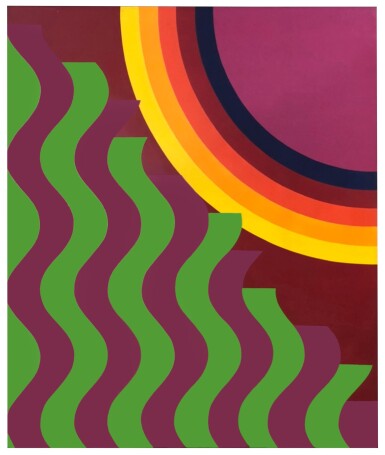This Too Shall Pass
This Too Shall Pass

MOHAMMED MELEHI | SOLEIL OBLIQUE II
Lot Closed
June 25, 12:21 PM GMT
Estimate
80,000 - 120,000 USD
Lot Details
Description
MOHAMMED MELEHI
b.1936
SOLEIL OBLIQUE II
signed, titled and dated 1971 on the reverse
cellulose lacquer on plywood
118.5 by 99.5cm.; 46¾ by 39¼ in.
Collection of the Artist, Morocco
Lawrie Shabibi, Dubai
Rabat, Galerie L'Atelier, Mohammed Melehi, 1971
Born in Morocco in 1936, Mohamed Melehi can be considered as one of the most important artists in the country. A painter, photographer, muralist and designer as well as a teacher and cultural activist, he was a leading figure in the radical Casablanca Art School and a formative leader in the artistic and cultural development of post-colonial Morocco.
Melehi graduated from the École des Beaux-Arts, Tétouan, Morocco, in 1955. He further developed his studies in the Arts throughout the late 1950’s, studying painting in Seville and Madrid, honing his sculpting skills in Rome and learning about engraving in Paris. Ultimately, Melehi traveled to America where he accepted a scholarship to study at Columbia University in New York from 1962-1964. New York, excitingly at the time, was a hub for post-modern artistic development – the Abstract Expressionist movement and the Color Field movement played a pivotal role to the burgeoning art scene that Melehi experienced during his time there. Following his years in New York, Melehi would begin to explore his cultural heritage as a primary source of inspiration.
Melehi’s art captures a post-modern aesthetic with the cultural richness of Moroccan-Berber crafts, driven by the lifeblood of social activism and a commitment to local artistic spirit. The colour palette used by Melehi is bolder through the use of more brilliant and vivacious colors as clearly demonstrated in Lot 11 entitled Soleil Oblique II painted in 1971.
The artist’s first UK retrospective in 2019 at Mosaic Rooms entitled New Waves, in a way, served both as an affirmation as much as it did as a turning point in the way Melehi, with his artistic and cultural production, is now understood within an international context. The show later traveled to Dubai and was exhibited at Concrete at AlSerkal Avenue.
While his cultural heritage worked its way into Melehi’s narrative once he returned to Morocco, it was perhaps while in New York that Melehi truly began to develop his own style. The works he produced there differed from the paintings he made in Italy. Nonetheless, Melehi’s artistic pedagogy allowed him to delve even further and expand his oeuvre. In the 1970s, we begin to see a shift from his linear paintings to the iconic flame/wave shaped undulations that are unique to Melehi’s opus.
The painting entitled Casa painted in 1970, heldin the collection of the Tate Modern, is the sister painting presently offered. In Soleil Oblique, we see the repetition of vertical colorful waves, undulating to form a rhythm. The composition of Melehi’s iconic waves cascade from left to right into the horizon, as though the flames are shifting towards the sun situated the top right corner. The interplay between earth and heaven or fire and wind, allude to Melehi’s bold spirit – in the assurance of his colour delineations it feels embodied in the panel. Soleil Oblique was exhibited in one of the artist's first solo exhibiton at Galerie l'Atelier in 1971 alongside Casa painted the year before. The present work has rarely been seen in the public sphere since the exhibition.
The significance of this painting also lies in the fact that it is a departure from the form of medium (canvas), where Melehi opts for panel instead. The present work from 1971 is indeed a rare piece of museum attributes. It pulsates with rhythm and vitality, marking with great fervor, the birth of his iconic undulating waves that were inspired by his homeland – Morocco.
